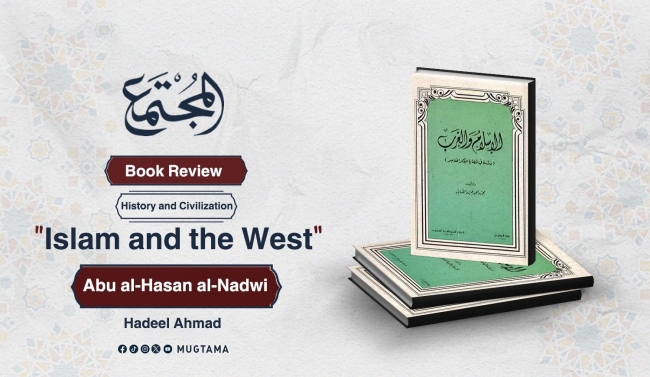Book Review: “Islam and the West” by Abu al-Hasan al-Nadwi
A Historical Perspective and Cultural Analysis
In his analysis, al-Nadwi explores the roots of interaction between Islam and the West by discussing the early Islamic conquests and the Crusades, highlighting the intellectual and cultural exchanges that occurred during the Middle Ages. Al-Nadwi underscores Islam’s role in reshaping history, establishing principles of equality and human brotherhood, restoring human dignity, and granting women their rights, which had been lost in previous eras. In discussing the contributions of Islamic civilization to the European Renaissance and the Enlightenment, al-Nadwi rejects the traditional Eurocentric view and calls for the establishment of academic centers in the West dedicated to the objective study of the Qur'an and the life of the Prophet Muhammad, free from the negative influences of the Crusades and the superiority complex stemming from political dominance. These centers, he argues, could reveal the intricate web of intellectual and cultural exchanges that contributed to the development of both societies.
Critique of Colonialism and Modern Challenges
Al-Nadwi’s critique of Western colonialism and its lasting impact on the Islamic world is one of the book's most powerful and clear aspects. He does not shy away from discussing the cultural, political, and economic consequences of colonial dominance. He offers a sharp and balanced critique of this period, shedding light on the challenges faced by Muslim communities. Moreover, He compares Muslims of the past, who, despite their poverty and hardship, stood up against the ruling powers enjoying luxury and authority, with today's Muslim youth, who struggle under the pressures of globalization and the spread of Western secular values. Al-Nadwi explains how some young Muslims who leave their countries to receive a Western education lose the missionary spirit and enthusiasm that Muslims had beck then, becoming instead captives of materialism and modern traditions, making it difficult for them to maintain their religious and cultural identity.
A Call for Dialogue and Mutual Understanding
Despite the critical tone al-Nadwi adopts in discussing some aspects of Western influence, his central message revolves around the call for dialogue and coexistence between civilizations. He sees a golden opportunity for a genuine exchange between Islam and the West, where Islam, with its moral and universal principles, could guide modern science and technology to better serve humanity. He advocates for mutual respect and deep understanding between the two civilizations, emphasizing that their cooperation could lead to a balance between material progress and spiritual values while preserving the unique identity of each. In his view, this is not a vision of conflict but one of cooperation that could elevate humanity as a whole.
Renaissance and Reform: A Path to the Future
Al-Nadwi addresses the urgent need for revival and reform within the Islamic world, calling for a return to the moral and spiritual foundations upon which Islamic civilization was built in its early days. He believes that modern scientific and technological advancement can lead humanity to the peak of progress, but without spiritual values and righteous intellectual leadership, this progress becomes a danger that threatens humanity with destruction. Al-Nadwi points out that the individuals produced by modern intellectual leadership are often devoid of faith and certainty, making them incapable of building a virtuous and secure society. Therefore, he calls for a revolutionary and bold scientific and intellectual effort to restore the spirit to Islamic societies. He emphasizes the importance of education and spiritual renewal as a path to building a bright future that meets the challenges of the modern age.
Conclusion
“Islam and the West” is a distinguished intellectual work that offers valuable insights into the complex relationship between Islam and the West. Al-Nadwi's scholarly approach and deep understanding of Islamic principles will attract anyone interested in cultural relations, Islamic studies, or history. His balanced critique, call for dialogue, and focus on renaissance and reform reflect not only a historical analysis but also a guide for future interaction between these two ancient civilizations.


